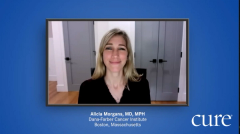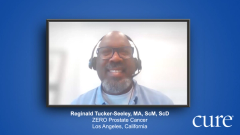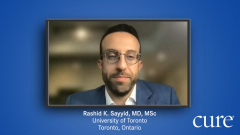
Educating Patients and Caregivers About Prostate Cancer
Alicia Morgans, MD, MPH, offers advice to patients newly diagnosed with prostate cancer and reviews educational resources available for patients and their caregivers.
Episodes in this series

Transcript:
How do you educate patients and caregivers in your practice about prostate cancer?
Alicia Morgans, M.D., MPH: When patients and their caregivers ask me for resources for education about prostate cancer, I often refer them to places like the Prostate Cancer Foundation to look up thoroughly curated, tested and checked material because there is the opportunity for misinformation on the internet when it comes to prostate cancer care or any kind of cancer care, for that matter. Having a trusted resource is really important. The Prostate Cancer Foundation has some great pamphlets and information that has been checked by physicians and clinical teams to make sure that all of the things in there are updated and true.
The other place that I often send patients is to the ZERO Prostate Cancer website, which is really nice because it also has curated information that I can trust and that patients can trust, but also has access to support group information so that patients, no matter where they live in the country, can find a support group that might be a place where they can go in person or perhaps online to hear stories from patients like them and to ask questions of other people who are going through what they've gone through or who have gone through what they're going through. These kinds of resources are really important.
I would also say that I encourage patients to ask their medical teams when they do have questions. Because even if you find something online at a trusted source, it may not necessarily translate in a way that makes sense to you when you read it, or you may have some misunderstanding about what you're reading because some of this stuff is really complicated. When things don't make sense, or even just to make sure that you have your information straight, it's really a good thing to ask your nursing team, your doctor team, your nutrition or dietitian team member, or your physical therapist about what you're reading and really make sure that what you're reading and think you understand is absolutely correct.
If I had to give some advice to someone who was newly diagnosed with prostate cancer and was heading to their doctor to work through a treatment plan, I would encourage people to say to their doctor, “Can you tell me and make sure that I understand, is this cancer curable or not? Is it treatable but not curable? What's the best treatment plan to be the most aggressive that I can be against my cancer? And what options do I have in terms of making sure that my quality of life and my day-to-day life is actually preserved as much as possible?”
I would also encourage people to be really candid about questions they have when it comes to their sexual health, mental health and physical health, because there are changes that happen in someone's body when they go through treatments like androgen deprivation therapy, or ADT, that affect all of those things and many other areas, too. Being bold to ask the questions that you really have is important. No doctor, nurse or health care team member is going to judge you. And if they do, it's okay to get another team or another doctor. If you wonder, “Is my sexual health going to be the same after I get treatment for prostate cancer?” Depending on what your treatment is, the answer will be different. Your sexual health can be improved, maintained, can be better even if you have some changes in it. But it's important to ask the questions, “How do I get there? Who can help me improve my erectile dysfunction? Who can help me improve issues that I have with libido?” Whatever the question is. But that is probably one of the most under-discussed areas in prostate cancer that is most meaningful to patients.
I would also really encourage people to talk with their doctor or their clinical team about mental health because having a cancer diagnosis in itself can put someone at very high risk for developing depression or having adjustment issues that may be helped by counseling or by medications. And it's not to say that it is anyone's fault or that you're weak if you develop mental health concerns like anxiety or depression. It's a physiologic change that happens because of the way bodies respond to stress. And we have treatments, including counseling and medicines, that can help you feel better. And finally, sleep is something that can be affected. Always ask about sleep and if there are any things that you can do to feel better. But I think the supportive needs of people with prostate cancer are things that we don't discuss enough. Be empowered to ask your doctor. Be empowered to say, “Is my treatment the right treatment for me? What options do I have?”, if you ever feel like you're going down the wrong road or you just want to make sure from the get-go.
Transcript is AI-generated and edited for clarity and readability.







